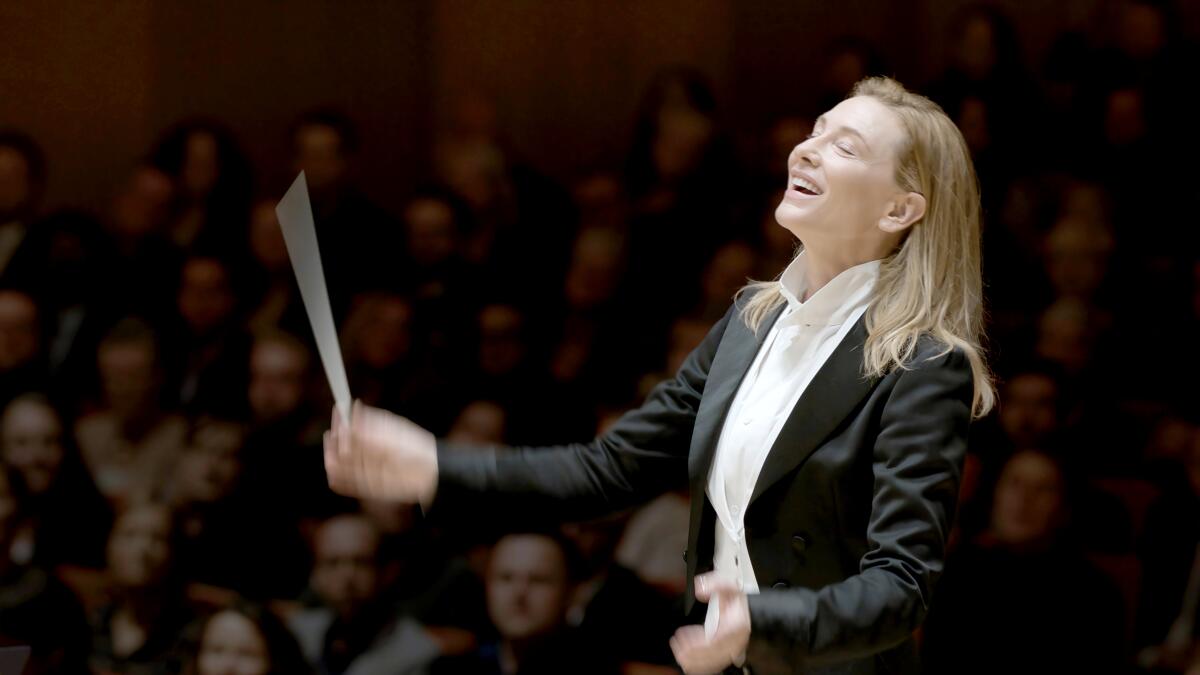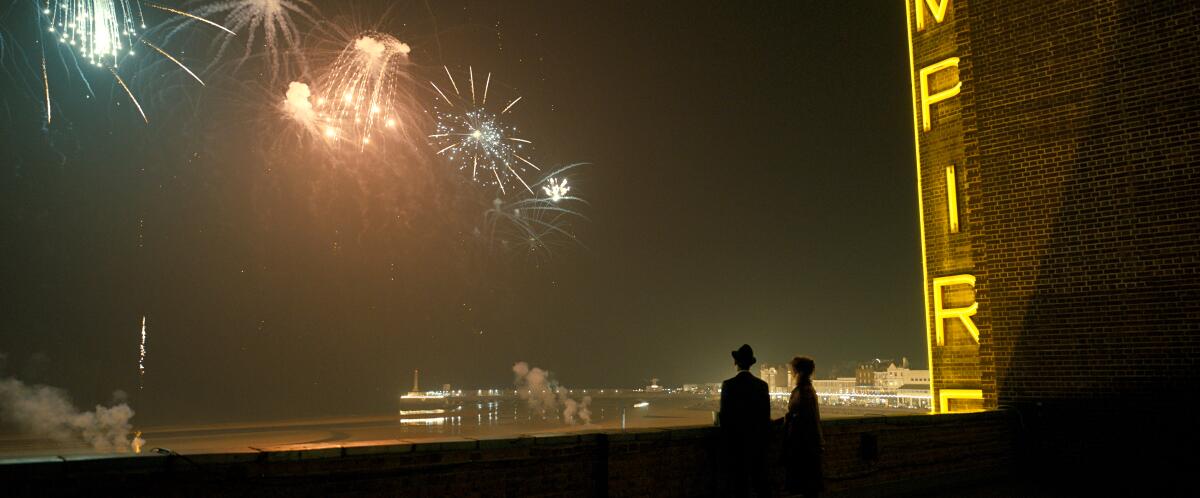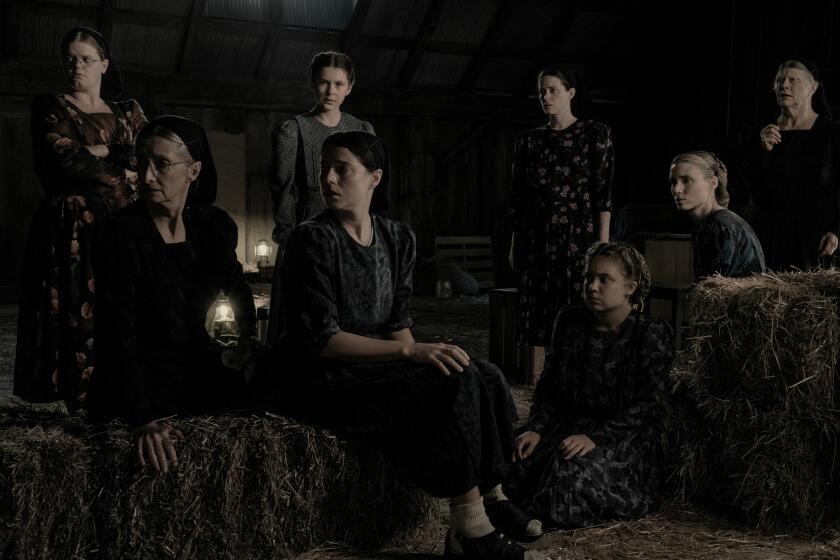Cate Blanchett delivers a Telluride ‘Tár’ de force, but Olivia Colman can’t save ‘Empire of Light’

- Share via
TELLURIDE, Colo. — When Cate Blanchett took the stage Saturday evening for her Telluride Film Festival tribute, right after a screening of her astonishing new movie, “Tár,” the audience must have enjoyed a bit of a chuckle. Most audiences that get a postscreening Q&A with Blanchett — and there probably will be a few in the months to come — will find themselves in a similar position. In “Tár,” Blanchett plays a world-renowned classical conductor named Lydia Tár, and one of her first scenes is a long, riveting and revealing conversation with the New Yorker writer Adam Gopnik (playing himself), held in front of a live audience.
It’s an instantly captivating sequence, fearless in its musical and intellectual rigor, that hard-wires us into the workings of Lydia’s formidable mind. We drink in her black-suited elegance and sense her initial guardedness, though any anxiety soon melts away as Lydia, as assured a speaker as she is a conductor, begins holding forth about her art, her love for Mahler and Bernstein, and her experiences studying, playing and conducting music all over the world. Her synapses fire like mad and her hands spring to inventive life as she describes her role in not just keeping but creating time, molding and sculpting it with a level of imagination that the audience will detect only as a sublime piece of music.
“Tár,” the third and finest feature directed by Todd Field (“In the Bedroom,” “Little Children”), keeps its own time beautifully. The movie runs a mesmerizing two hours and 38 minutes; I didn’t want it to end. It’s the story of a magnificent monster and her very public downfall, but what makes that downfall so persuasive is that it happens so gradually and springs forth from such quietly intimate roots. The story proceeds in carefully orchestrated movements, as it were, and each of those movements draws us a little deeper into Lydia’s highly influential and rigidly hierarchical corner of the music world.
That world encompasses New York, where she teaches at Juilliard, and Berlin, where she serves as head conductor of the Berlin Philharmonic. In Berlin too she makes a home of sorts with her partner, Sharon (Nina Hoss), herself an accomplished violinist, and their young daughter. “Tár” may be a work of fiction, but everything about it rings meticulously true, from the impeccably cast musicians playing in Lydia’s orchestra to the illicit passions and hidden rivalries that she alone has the power and ruthlessness to nurture.

This is Field’s first movie in 16 years (and his first original screenplay, after two adaptations), and he unleashes what feels like close to a decade’s worth of pent-up, razor-sharp observations about the politics of the art world, the tensions of academia, the debate over cancel culture, the reckonings of #MeToo and, on a not-unrelated note, the ascendancy of women in creative and professional spaces long dominated by white men. And in this space, Lydia refuses — arrogantly, maddeningly and sometimes heroically — to bow to what she sees as prevailing liberal orthodoxies.
Hailed as the first woman to conduct one of the world’s great orchestras, she nonetheless dismisses gender inequality as a significant deterrent to her success. And in one of the movie’s most coldly electrifying scenes, she forcefully rebukes a BIPOC student who takes issue with Bach and other acclaimed white male composers, defending the canon with a reactionary ferocity that is nonetheless steeped in a profound understanding of music.
That scene and others raise the ever-familiar question of whether one can or should separate the art from the artist — a question that carries particular relevance for Lydia, whose habit of sleeping with her students is becoming an ever more open secret.
I mean it as the highest compliment when I say that Lydia Tár herself is not so easily extricated from the artist who plays her, in the sense — and only in the sense — that we are watching one genius incarnate another.
At the risk of indulging more musical metaphors, Blanchett’s work here feels genuinely, breathtakingly symphonic in its arrangement of components. To play Lydia, Blanchett learned to speak German, play the piano and conduct music, but the brilliance of her work goes beyond the conventions of study, practice and research. It takes an actor who can seem, as Blanchett does, like both a gifted orchestrator and a finely tuned instrument in the same instance.
Sarah Polley and Alejandro G. Iñárritu deliver wildly different movies that kick off the 2022 Telluride Film Festival.
“Tár,” which Focus Features will release Oct. 7 in theaters, arrived in Telluride on a wave of critical acclaim that began last week at the Venice International Film Festival, where Blanchett’s performance was immediately tipped as an early frontrunner for an Academy Award. Both festivals, along with the upcoming Toronto International Film Festival, have long been reliable and coveted launchpads for future award-winning performances. Telluride itself has minted a few recent Oscar winners, including Gary Oldman (“Darkest Hour”), Renée Zellweger (“Judy”) and — speaking of separating the art from the artist — Will Smith (“King Richard”).
The Oscar punditry machine was in predictably full swing after the Telluride world premiere of “Empire of Light,” a nicely acted misfire from director Sam Mendes (“1917,” “American Beauty”). Most of the excitement has swirled around the much-laureled Olivia Colman for her performance as Hilary, a lonely, depressive woman who works as a duty manager at a movie theater in the English seaside town of Margate. The story spans the early 1980s — “The Blues Brothers,” “Stir Crazy,” “Being There,” “Chariots of Fire” and “Raging Bull” will all grace the marquee at some point — and centers on Hilary’s romance with a new employee, Stephen (a fine Micheal Ward). Their relationship is presented, facilely, as a bond between two individuals who are both out of step with their environs: Hilary for reasons that will soon become clear, and Stephen because he’s a Black man living in a profoundly racist town, country and moment.

The two leads are backed by a supporting cast that includes Colin Firth, Tanya Moodie, Tom Brooke and, as the theater’s veteran projectionist, a very good Toby Jones. But they’re all let down to varying degrees by a script whose many parts come together like oil and water and concession-stand soda. This is a story about repressed mental trauma and racist violence spilling out into the open, issues that Mendes has swept neatly under the rug of a grandiose love letter to the movies, and also movie theaters. The director, making his solo screenwriting debut, has described this film as his most personal work, one that was born from the pandemic and its attendant despair at not being able to come together with others in public spaces, theaters very much included.
I’m as susceptible as anyone to sentimental nostalgia about my favorite art form and its endangered public venues. (“Empire of Light,” a Searchlight Pictures release, will hit theaters Dec. 9.) That said, my own taste runs toward movies that don’t treat anti-Black violence as a vehicle for a white woman’s emotional and psychological deliverance — a narrative turn that’s frankly a gross insult to both characters. And although Colman peels back Hilary’s layers of grief and rage with all the ferocity and subtlety you’d expect from an actor of her caliber, even she can’t sell the joyfully beaming pivot required of her in an interminable sequence in which “Empire of Light” essentially becomes the ’80s equivalent of Nicole Kidman’s AMC commercial.
It’s the kind of moment that feels contrived to flatter Hollywood’s love for itself, and it’s a reminder that we do not, in fact, need more ostentatious love letters to the movies. A good movie that respects the audience’s intelligence is love letter enough.
Timothée Chalamet reunites with Luca Guadagnino on teen cannibal romance ‘Bones and All,’ a star-making vehicle for Taylor Russell.
More to Read
Only good movies
Get the Indie Focus newsletter, Mark Olsen's weekly guide to the world of cinema.
You may occasionally receive promotional content from the Los Angeles Times.












